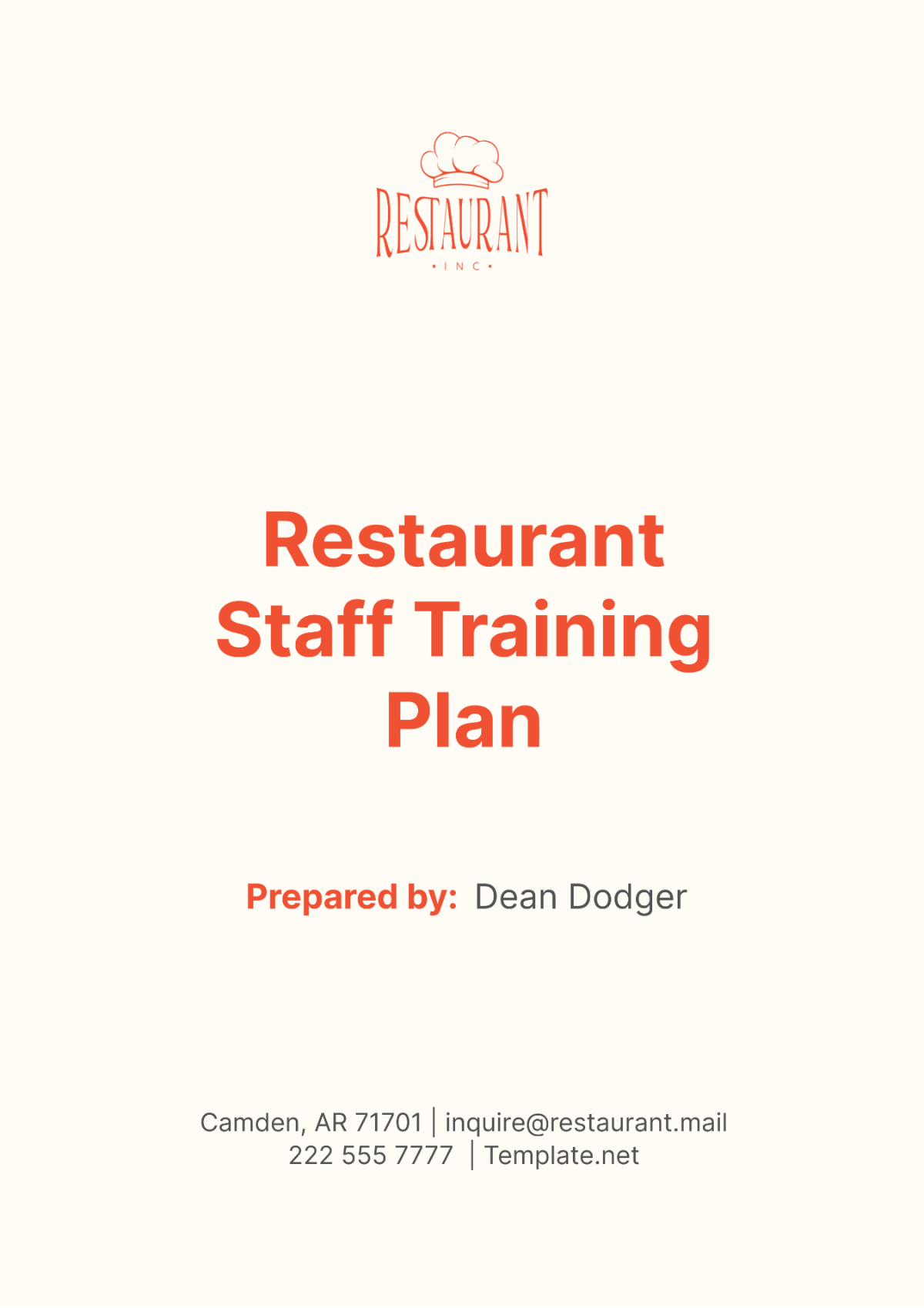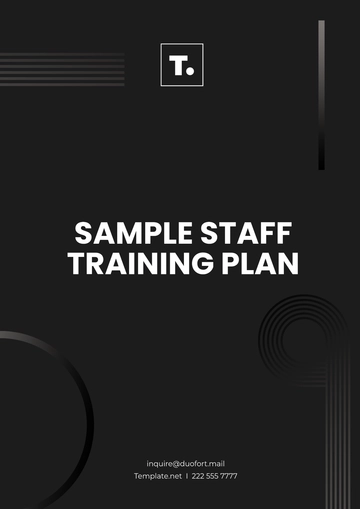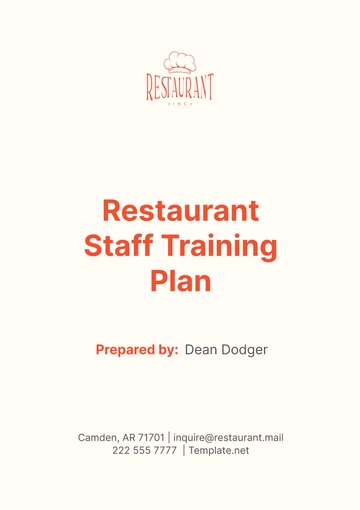Free Restaurant Staff Training Plan

I. Introduction
A. Training Overview
The Staff Training Plan for [Your Company Name] is a comprehensive program meticulously designed to enhance the skills and knowledge of all our restaurant staff. The primary aim of this plan is to ensure that each team member is equipped to deliver exemplary service and maintain the highest standards of restaurant operation. We understand that our staff is the backbone of our restaurant, and their performance directly impacts the dining experience of our customers. Therefore, we have developed this training plan to empower our staff with the necessary skills and knowledge to excel in their roles.
In addition to equipping our staff with the necessary skills, the training plan also aims to foster a culture of continuous learning and development within our restaurant. We believe that learning is an ongoing process, and our training plan reflects this belief. It provides opportunities for both new hires and existing staff to learn new skills, enhance their knowledge, and grow professionally. By promoting continuous learning, we aim to keep our staff motivated, engaged, and ready to meet the evolving demands of the restaurant industry.
B. Training Objectives
By the end of this training, participants will be able to:
Understand the Core Values and Service Standards: Participants will gain a deep understanding of [Your Company Name]'s core values and service standards. This understanding will guide their interactions with customers and their approach to their work. It will also help them align their actions with the restaurant’s mission and vision.
Perform Role Duties with Competence and Care: The training will equip participants with the skills and knowledge necessary to perform their specific role duties with competence and care. This includes everything from customer service to food preparation and safety procedures. By mastering their role duties, participants will be able to contribute effectively to the restaurant’s operations and customer satisfaction.
Handle Customer Interactions Professionally: Participants will learn how to handle customer interactions in a professional manner, ensuring that all customers have a positive experience at our restaurant. This involves learning effective communication skills, understanding customer needs, and handling customer complaints and queries effectively.
Operate the Restaurant’s POS System Efficiently: The training will include a detailed tutorial on how to operate the restaurant’s Point of Sale (POS) system efficiently. This will enable participants to process orders and payments quickly and accurately, thereby enhancing the restaurant’s operational efficiency and customer service.
Manage Emergencies and Unexpected Situations: Participants will be trained on how to manage emergencies and unexpected situations. This includes first aid training and instruction on how to comply with safety protocols. By being prepared for emergencies, participants will be able to ensure the safety and well-being of both the staff and customers.
II. Training Schedule
The training schedule is a key component of our plan. It provides a structured timeline for the delivery of the training content, ensuring that each week is focused on a specific area of learning. The following table outlines the proposed training schedule:
Week | Focus Area | Activities |
|---|---|---|
Week 1 | Orientation & Company Culture | Introduction to [Your Company Name], mission, vision, and values discussion, meet and greet with leadership. |
Week 2 | Role-Specific Skills | Detailed sessions on each role's duties and responsibilities, shadowing sessions with experienced staff. |
Week 3 | Customer Service Excellence | Role-playing customer scenarios, communication skills workshops, handling difficult situations. |
Week 4 | Health & Safety | First aid training, emergency response drills, food safety handling according to Local Health Guidelines. |
A. Orientation & Company Culture
The first week of the training schedule is dedicated to orienting the staff to [Your Company Name]'s culture and values. This is a crucial step in helping new hires understand the restaurant’s mission, vision, and values. The meet and greet with leadership provides an opportunity for new hires to familiarize themselves with the team and the work environment.
B. Role-Specific Skills
The second week delves into the specific skills required for each role. Detailed sessions on each role’s duties and responsibilities provide the staff with a clear understanding of their roles. Shadowing sessions with experienced staff offer practical insights and allow new hires to learn from seasoned professionals.
C. Customer Service Excellence
The third week focuses on enhancing customer service skills. Role-playing customer scenarios and communication skills workshops equip the staff with the necessary skills to handle customer interactions professionally. These activities also prepare the staff to handle difficult situations effectively, ensuring that all customers have a positive experience at our restaurant.
D. Health & Safety
The final week emphasizes health and safety. First aid training, emergency response drills, and food safety handling sessions ensure that the staff are well-equipped to maintain a safe and healthy environment in the restaurant. This week reinforces the importance of health and safety in the restaurant industry and ensures that our staff are well-prepared to handle any emergencies or unexpected situations.
The training schedule plays a crucial role in the successful implementation of our plan. It provides a structured timeline for the delivery of the training content, ensuring that each week is focused on a specific area of learning. This systematic approach allows for a comprehensive coverage of all necessary topics and ensures that the training is delivered in a manageable and effective manner.
Moreover, the training schedule also serves as a roadmap for our staff, guiding them through the different stages of the training program. It helps them understand what to expect each week and prepares them for the learning journey ahead. By providing a clear and detailed training schedule, we can ensure that our staff are well-prepared to make the most of the training program.
III. Training Materials
To support the training program, we will provide a range of training materials. These materials will serve as valuable resources for our staff, both during and after the training program. The training materials include:
A. Employee Handbooks
Company Handbook: This handbook provides a wealth of information about our restaurant, including our mission, values, policies, and procedures. It serves as a go-to guide for our employees to understand our restaurant’s culture and expectations.
Role-Specific Handbook: Each role in our restaurant has a dedicated handbook that outlines the specific duties and responsibilities of the role. This helps our employees understand what is expected of them in their specific roles.
B. Operational Manuals
General Operational Manual: This manual provides detailed instructions for general operations within our restaurant. It serves as a valuable reference for our staff to understand the standard operating procedures.
Role-Specific Operational Manual: These manuals provide detailed instructions for specific roles within our restaurant. They serve as a valuable reference for our staff to understand the specific procedures related to their roles.
C. Access to the Online Training Portal
Online Training Modules: Our online training portal offers a range of training resources, including video tutorials, quizzes, and interactive modules. These resources provide flexible learning options for our staff and allow them to learn at their own pace.
Resource Library: The online training portal also includes a resource library where our staff can find additional learning materials related to their roles and the restaurant industry.
D. Customer Service Communication Scripts
General Communication Scripts: These scripts provide guidelines on how to communicate effectively with customers in various scenarios. They help our staff handle customer interactions professionally and consistently.
Scenario-Specific Scripts: These scripts provide specific guidelines for handling common scenarios in our restaurant, such as dealing with customer complaints or special requests. They help our staff respond appropriately and effectively in different situations.
IV. Trainer Details
The quality of training is significantly influenced by the expertise and skills of the trainers. Therefore, at [Your Company Name], we ensure that our training sessions are conducted by leading industry experts. The following table provides an overview of the trainers who will be conducting the sessions:
Trainer | Expertise | Experience |
|---|---|---|
John Marriot | Culinary Skills | 10+ years in the restaurant industry, with a specialization in culinary arts. |
Ellen Brown | Customer Service | 8+ years in customer service training, with a focus on the hospitality industry. |
Harry Foster | Health & Safety | Certified health and safety trainer with 5+ years of experience in the restaurant industry. |
The selection of trainers is a critical aspect of our Staff Training Plan. By engaging industry experts, we ensure that our staff receive high-quality, relevant training. These trainers not only bring their expertise and knowledge to the training sessions but also share real-world insights and experiences, making the training more practical and engaging.
Additionally, the diversity of our trainers ensures that our staff receive well-rounded training. From culinary skills to customer service to health and safety, our staff are trained in all aspects of restaurant operations. This comprehensive training prepares our staff to handle a variety of situations and challenges they may encounter in their roles.
In conclusion, our trainers play a crucial role in the success of our training plan. Their expertise and experience ensure our staff receive high-quality training that equips them with the necessary skills and knowledge to excel in their roles. Through this training, we aim to build a highly skilled, knowledgeable, and motivated team that can deliver exceptional service to our customers.
V. Evaluation and Feedback
Evaluation and feedback are integral components of our training program at [Your Company Name]. They provide us with valuable insights into the effectiveness of the training, help us identify areas for improvement, and ensure that the training program evolves to meet the changing needs of our staff and restaurant operations.
A. End-of-Week Quizzes and Practical Assessments
To gauge the effectiveness of the training and ensure continuous improvement, we implement several evaluation methods:
End-of-Week Quizzes: At the end of each week, participants will take a quiz to assess their understanding of the week’s training content. These quizzes provide immediate feedback to participants and trainers, allowing for timely adjustments to the training program. They also serve as a tool for participants to review and reinforce their learning.
Practical Assessments: In addition to quizzes, participants will also undergo practical assessments. These assessments allow participants to demonstrate their skills in a practical setting, providing a more accurate measure of their ability to apply what they’ve learned. The practical assessments also provide an opportunity for trainers to give personalized feedback and guidance to each participant.
Role-Playing Exercises: Role-playing exercises are used to assess participants’ customer service skills. These exercises simulate real-life customer interactions, allowing participants to practice their skills in a safe and supportive environment.
B. Feedback Forms
Feedback forms are another important tool for evaluation and continuous improvement:
Participant Feedback Forms: At the end of the training program, participants will be asked to complete feedback forms. These forms provide valuable insights into the participants’ experiences and perceptions of the training program. They allow us to understand what aspects of the training were most beneficial, what areas could be improved, and how the training has impacted the participants’ confidence and competence in their roles.
Trainer Feedback Forms: Trainers will also complete feedback forms, providing their observations and insights into the participants’ progress, the effectiveness of the training methods and materials, and suggestions for future training programs.
Peer Feedback Forms: Participants will have the opportunity to provide feedback on their peers. This peer feedback can provide valuable insights into team dynamics, communication skills, and collaborative problem-solving abilities.
VI. Final Thoughts
The Staff Training Plan for [Your Company Name] is a comprehensive and strategic approach to enhancing the skills and knowledge of our restaurant staff. It is designed with the understanding that our staff is the backbone of our restaurant, and their performance directly impacts the dining experience of our customers. The training plan covers key areas such as recruitment and selection, training and development, performance management, employee engagement and retention, and compliance and legal aspects. Each of these areas plays a crucial role in the successful operation of our restaurant.
In conclusion, the training plan is more than just a program; it’s a commitment to our staff’s growth and development. It’s about creating a workplace where our employees feel valued, respected, and motivated to perform at their best. By investing in our employees’ growth and development, recognizing their contributions, and maintaining a fair and respectful workplace, we can ensure the success of our restaurant and deliver exceptional service to our customers.
- 100% Customizable, free editor
- Access 1 Million+ Templates, photo’s & graphics
- Download or share as a template
- Click and replace photos, graphics, text, backgrounds
- Resize, crop, AI write & more
- Access advanced editor
Enhance staff development initiatives with the Restaurant Staff Training Plan Template from Template.net! This resource offers an editable format to outline training programs easily. Customize the plan using its customizable features to address specific training needs and objectives. With the aid of the AI Editor Tool, streamline training plan development!
You may also like
- Finance Plan
- Construction Plan
- Sales Plan
- Development Plan
- Career Plan
- Budget Plan
- HR Plan
- Education Plan
- Transition Plan
- Work Plan
- Training Plan
- Communication Plan
- Operation Plan
- Health And Safety Plan
- Strategy Plan
- Professional Development Plan
- Advertising Plan
- Risk Management Plan
- Restaurant Plan
- School Plan
- Nursing Home Patient Care Plan
- Nursing Care Plan
- Plan Event
- Startup Plan
- Social Media Plan
- Staffing Plan
- Annual Plan
- Content Plan
- Payment Plan
- Implementation Plan
- Hotel Plan
- Workout Plan
- Accounting Plan
- Campaign Plan
- Essay Plan
- 30 60 90 Day Plan
- Research Plan
- Recruitment Plan
- 90 Day Plan
- Quarterly Plan
- Emergency Plan
- 5 Year Plan
- Gym Plan
- Personal Plan
- IT and Software Plan
- Treatment Plan
- Real Estate Plan
- Law Firm Plan
- Healthcare Plan
- Improvement Plan
- Media Plan
- 5 Year Business Plan
- Learning Plan
- Marketing Campaign Plan
- Travel Agency Plan
- Cleaning Services Plan
- Interior Design Plan
- Performance Plan
- PR Plan
- Birth Plan
- Life Plan
- SEO Plan
- Disaster Recovery Plan
- Continuity Plan
- Launch Plan
- Legal Plan
- Behavior Plan
- Performance Improvement Plan
- Salon Plan
- Security Plan
- Security Management Plan
- Employee Development Plan
- Quality Plan
- Service Improvement Plan
- Growth Plan
- Incident Response Plan
- Basketball Plan
- Emergency Action Plan
- Product Launch Plan
- Spa Plan
- Employee Training Plan
- Data Analysis Plan
- Employee Action Plan
- Territory Plan
- Audit Plan
- Classroom Plan
- Activity Plan
- Parenting Plan
- Care Plan
- Project Execution Plan
- Exercise Plan
- Internship Plan
- Software Development Plan
- Continuous Improvement Plan
- Leave Plan
- 90 Day Sales Plan
- Advertising Agency Plan
- Employee Transition Plan
- Smart Action Plan
- Workplace Safety Plan
- Behavior Change Plan
- Contingency Plan
- Continuity of Operations Plan
- Health Plan
- Quality Control Plan
- Self Plan
- Sports Development Plan
- Change Management Plan
- Ecommerce Plan
- Personal Financial Plan
- Process Improvement Plan
- 30-60-90 Day Sales Plan
- Crisis Management Plan
- Engagement Plan
- Execution Plan
- Pandemic Plan
- Quality Assurance Plan
- Service Continuity Plan
- Agile Project Plan
- Fundraising Plan
- Job Transition Plan
- Asset Maintenance Plan
- Maintenance Plan
- Software Test Plan
- Staff Training and Development Plan
- 3 Year Plan
- Brand Activation Plan
- Release Plan
- Resource Plan
- Risk Mitigation Plan
- Teacher Plan
- 30 60 90 Day Plan for New Manager
- Food Safety Plan
- Food Truck Plan
- Hiring Plan
- Quality Management Plan
- Wellness Plan
- Behavior Intervention Plan
- Bonus Plan
- Investment Plan
- Maternity Leave Plan
- Pandemic Response Plan
- Succession Planning
- Coaching Plan
- Configuration Management Plan
- Remote Work Plan
- Self Care Plan
- Teaching Plan
- 100-Day Plan
- HACCP Plan
- Student Plan
- Sustainability Plan
- 30 60 90 Day Plan for Interview
- Access Plan
- Site Specific Safety Plan

